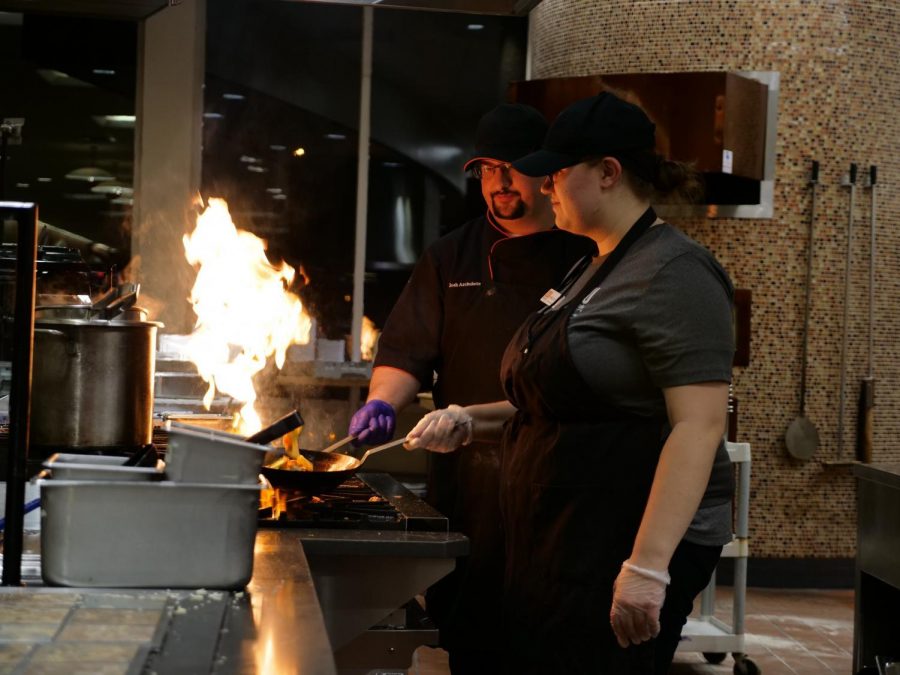Students holding on-campus jobs experience unique benefits, drawbacks
November 26, 2018
Oregon State University offers ample opportunities for students to gain experience with part-time jobs on campus with outlets like University Housing and Dining Services and the Memorial Union, among others.
There are positives and negatives of working an on-campus job and it may not be suitable for every student, although some students have little choice in order to pay for their education.
Lily Kilbane, student worker at McNary Dining, works both an on-campus and off-campus job to earn income.
“My parents do not support me financially and never have, so it’s not new to me,” Kilbane said. “I’ve had a job since I was 15 because my parents wouldn’t buy things I didn’t necessarily need.
Sarah Hirsch, third-year studying bioengineering, said she comes from a low-income family and is the first one in her immediate family to attend a four-year university and earn a degree.
“As an engineer, my education is more expensive than most other majors,” Hirsch said in an email. “I would not be able to go to school if I didn’t have a job or a way to earn income.”
Kilbane said she needed to get another job as a supplement because student jobs only allow employees to work part time.
“On campus there is more flexibility but there are a lot of pros and cons, on campus I only get paid monthly,” Kilbane said. “It is hard to make your budget last an entire month especially only working 20 hours a week.”
Hirsch said she chooses to work two jobs to help with costs of being a student.
“I focus on my classes first then I work out my UHDS schedule based off that,” Hirsch said. “I then tell my other job my schedule for the days and hours I can work.”
Catherine Danna, student studying new media communications and employee of Off the Quad, said they work with her schedule to make sure there is no conflict with classes.
“I am choosing to stick with an OSU job because I truly enjoy being able to work on campus, with my peers and around my school schedule,” Danna said.
Kilbane said the dining centers allow for the students to make their own schedule so that they have control over how their time is spent.
“UHDS has been very accommodating,” Kilbane said via email. “I’ve never personally reached out to UHDS about mental health struggles I’ve had, but I have coworkers who have told me that UHDS staff takes the mental health of their employees very seriously.”
Hirsch said UHDS has updated their call-in policy so they can no longer ask why a student is calling out of a shift whether it be a physical or mental health issue.
“You can have homework that you need to do or dying from the Black Plague, but whoever takes your call when you do call in can’t ask you why you aren’t coming in.”
McNary Dining has an attendance point system to monitor tardiness, call outs, no shows and additional shifts, to attempt to accommodate student schedules.
“You start out in the beginning of the term with 12 points, depending on what goes on you lose or gain points,” Hirsch said. “ If you are late minus one, a proper call out at least two hours ahead is minus three and no call no show is minus six.”
However, Kilbane said that in her view the system can be unreasonable at times because the point values are weighted unevenly.
“For calling out once it could be up to seven points deducted,” Kilbane said. “You can cover three shifts which could be up to twelve hours but that earns your points for one call out.
Benefits are given to each student who is employed by the school, including a food discount. There are strict rules surrounding this offer, however.
“We are given 50 percent off of meals but only at Off the Quad, it cannot be any packaged items and we were not allowed to bring it with us after our shift,” Danna said. “If you wanted to bring food with you for whatever reason like class or another job you could, but only for the original price.”
The restaurants give out this discount known as a meal perk while students are working. It can be used a maximum of once per day, and it can only be used an hour before, and hour after or during a shift, as it is intended to be solely for the student worker’s use.
Kilbane said students should do research before accepting a job on campus to understand what the job entails.
“For me it wasn’t the most practical, location wise, but I would recommend McNary Dining, especially 541 because it really does feel like a family,” Kilbane said.
Hirsch said this job allows for students to understand what the workforce is like and prepares them for future careers
“You get paid, make friends, make connections and learn skills you can apply elsewhere,” Hirsch said.










































































































